Your hub for learning in Clinical Immunobiology!
QUICK LINKS:

This is a book about immunology written by a doctor, for doctors. It provides the essential elements of the workings of the immune system that doctors need, particularly those with an interest in internal medicine.
A firm grasp of the immune system is important for all physicians, not only to understand the pathogenesis of many conditions, or to recognise and diagnose common immune conditions, but also to understand new therapeutics like monoclonals, checkpoint inhibitors, cytokine or Jak inhibitors etc., all of which are becoming increasingly used in clinical practice. This book will help the reader get on top of all this information and prepare them for imminent advances in this field.
The Primer not only teaches the fundamental biology of the immune system, but the relevance of each immunological concept for clinical medicine. This is what is meant by 'Clinical Immunobiology'.
The book does not get bogged down with the minutiae of immunology, but rather concentrates on the fundamentals of Immunobiology as they apply to human disease, the essentials that will be relevant to patients seen every day in practice.
The concepts are presented in an easy-going readable style, illustrated by over 350 bespoke graphics. Each chapter builds on the previous one, and when enough of the basic concepts have been explained, the importance of the immunobiology is illustrated by the exposition of specific medical disorders in detail, including clinical presentation, diagnosis and management, particularly concentrating on immunodeficiency disorders as well as allergic disease.
To read this book, it certainly helps to have a medical background, but even if you are a science undergraduate with one eye on medicine or medical research, there is enough basic biology presented to give a solid grounding in immunobiology as well as sparking your interest in the application of the science of immunology! But if your interest is in internal medicine and you need to get on top of the basic immunological concepts required to learn and practise medicine, this book is for you!
The Print edition of the Primer of Clinical Immunobiology is available from amazon.com:
The eBook of the Primer of Clinical Immunobiology is available on Apple Books and Kindle:
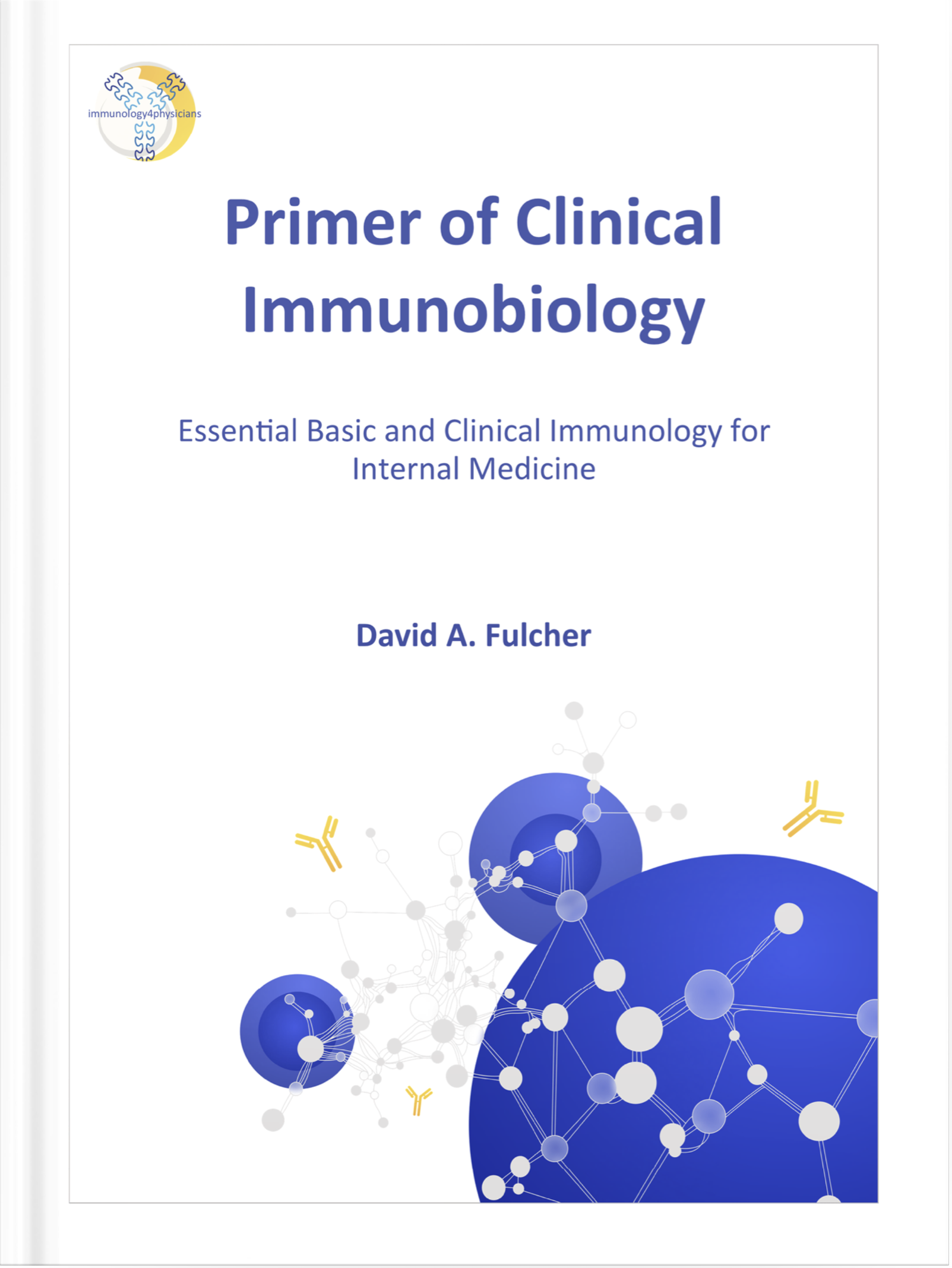
This is the lecture series based on the Primer of Clinical Immunobiology. Each chapter has a matching lecture, so read along, listen along, or both! Whatever suits your style of learning!
Drawing on material from the Primer and the Video lectures, these lectures and companion eBook tests your knowledge with 50 Multiple Choice Questons. First do the quiz (by video on Vimeo, or in the eBook) and then go through the worked answers. Each question contains cross-references to the Primer to direct your revision, and of course is replete with all the usual graphics.
MCQs in Clinical Immunobiology eBook is available NOW either as a video series (of two) and/or an eBook:
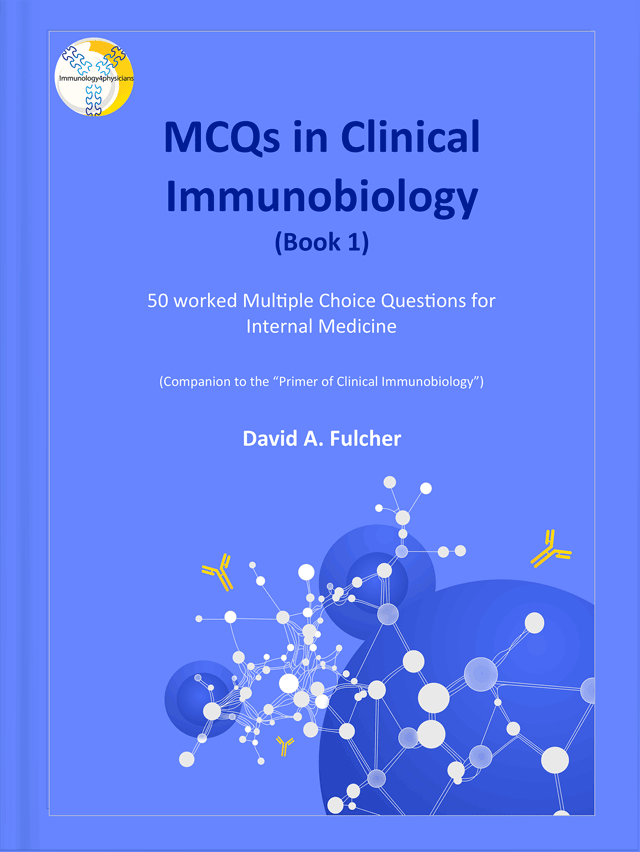
Immunology4physicians on Patreon is all about consolidation of learning in 'Clinical Immunobiology', reinforcing knowledge of basic immunobiology with an emphasis on how it helps an understanding of disorders across the spectrum of specialist internal medicine, particularly clinical immunology. Here you will find short lectures, MCQs, revision exercises and various snippets to help reinforce your knowledge of Immunology. It draws heavily on material from the Primer and Video lecture.
The site is free to join, and let's you access a few learning activities to give you an idea. To unlock access to the entire site of over 100 learning activities costs AUD $9.90/month.
Follow this link to join up:
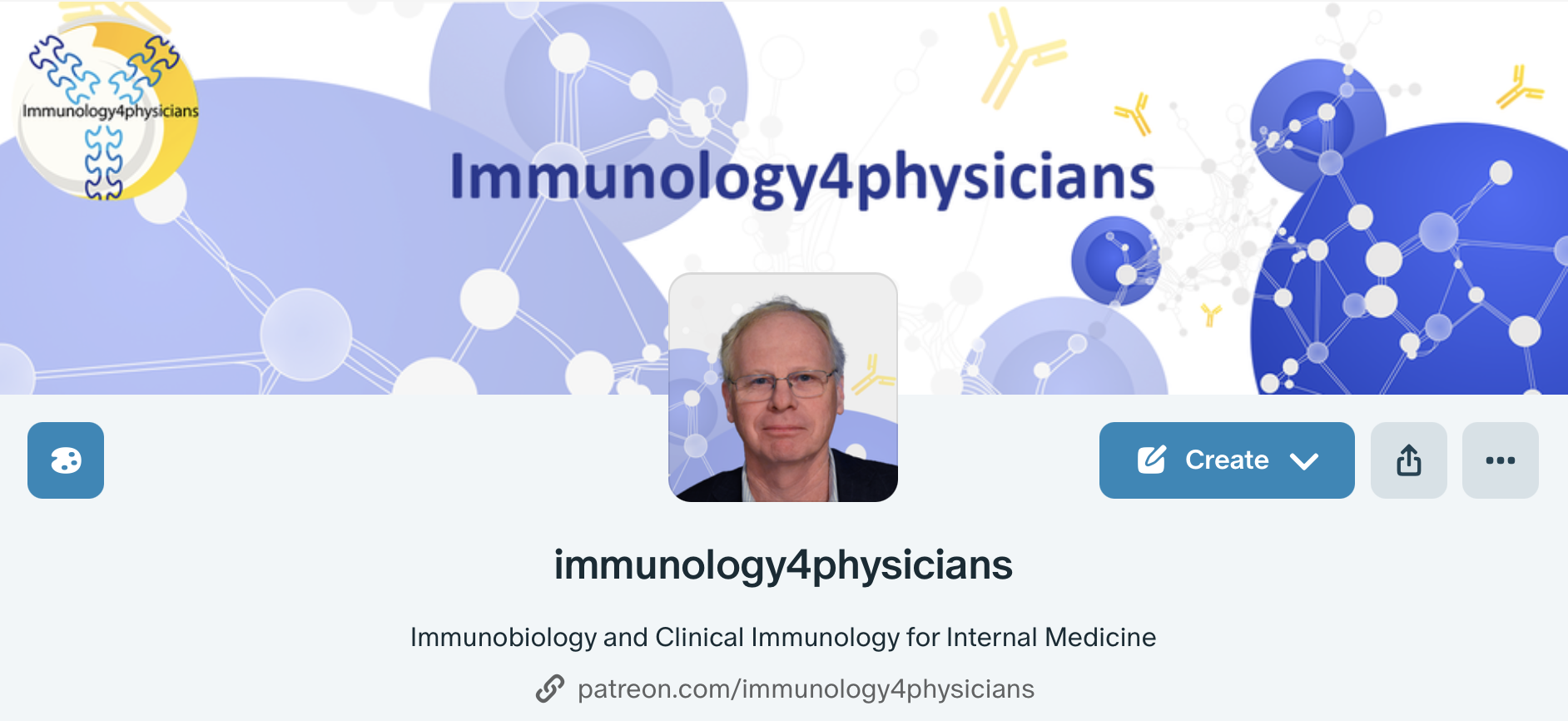
Vimeo lecture series in Clinical Immunobiology: AUD $285 ($US 185)
(Access to Revision and learning activities on Patreon: AUD $9.90 ($US7 per month))
Apple Books and Kindle: AUD $39.99
The course is designed to cover a wide scope of basic and applied immunology. Here's what we'll be covering!
Basic Science
Clinical Applications
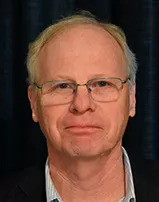
Prof David A. Fulcher
MBBS, PhD, FRACP, FRCPA
Basic Science

Prof David A. Fulcher
MBBS, PhD, FRACP, FRCPA
Clinical Applications

Prof David A. Fulcher
MBBS, PhD, FRACP, FRCPA
Basic Science
Clinical Applications

Prof David A. Fulcher
MBBS, PhD, FRACP, FRCPA
Basic Science
Clinical Applications

Prof David A. Fulcher
MBBS, PhD, FRACP, FRCPA
Basic Science
Clinical Applications

Prof David A. Fulcher
MBBS, PhD, FRACP, FRCPA
Basic Science

Prof David A. Fulcher
MBBS, PhD, FRACP, FRCPA
Clinical Applications

Prof David A. Fulcher
MBBS, PhD, FRACP, FRCPA
Basic Science
Clinical Applications

Prof David A. Fulcher
MBBS, PhD, FRACP, FRCPA
Clinical Applications

Prof David A. Fulcher
MBBS, PhD, FRACP, FRCPA
Basic Science
Clinical Applications

Prof David A. Fulcher
MBBS, PhD, FRACP, FRCPA
Basic Science
Clinical Applications

Prof David A. Fulcher
MBBS, PhD, FRACP, FRCPA
Basic Science

Prof David A. Fulcher
MBBS, PhD, FRACP, FRCPA
Basic Science

Prof David A. Fulcher
MBBS, PhD, FRACP, FRCPA
Basic Science
Clinical Applications

Prof David A. Fulcher
MBBS, PhD, FRACP, FRCPA
Basic Science
Clinical Applications

Prof David A. Fulcher
MBBS, PhD, FRACP, FRCPA
Basic Science
Clinical Applications

Prof David A. Fulcher
MBBS, PhD, FRACP, FRCPA
Basic Science
Clinical Applications

Prof David A. Fulcher
MBBS, PhD, FRACP, FRCPA
Basic Science
Clinical Applications

Prof David A. Fulcher
MBBS, PhD, FRACP, FRCPA
Clinical Applications
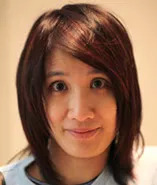
A/Prof Ming-Wei Lin
MBBS, FRACP, FRCPA
Clinical Applications

A/Prof Ming-Wei Lin
MBBS, FRACP, FRCPA
Basic Science
Clinical Applications

Prof David A. Fulcher
MBBS, PhD, FRACP, FRCPA
Basic Science
Clinical Applications

Prof David A. Fulcher
MBBS, PhD, FRACP, FRCPA
Basic Science
Clinical Applications

Prof David A. Fulcher
MBBS, PhD, FRACP, FRCPA
Basic Science

Prof David A. Fulcher
MBBS, PhD, FRACP, FRCPA
Slides are packed with detailed illustrations to reinforce critical immunological concepts

Dr David Fulcher (MBBS (Hons II), PhD, FRACP, FRCPA) obtained his medical degree from the University of Sydney in 1984, and after the obligatory Resident Medical Officer years, he specialised in Clinical Immunology and Immunopathology under the auspices of the Royal Australasian Colleges of Physicians / Pathologists (RACP, RCPA). He then proceeded to doctorate studies in B-cell tolerance, at what was to become the Centenary Institute, Sydney (PhD, 1996). Then he joined the public hospital system as a Clinical Immunologist/Immunopathologist for 20 before moving to private practice! Currently he works as Immunopathologist at 4Cyte Pathology. Dr Fulcher has been teaching Immunology his entire professional career! He has held every major Australian teaching position in Immunology and Immunopathology, including Co-ordinator of Advanced Training in Immunology, Chair of the Joint Specialist Advisory Committee in Immunology (RACP), and Chief Examiner in Immunopathology (RCPA). He was also Director of Physician Training and then Network Director of Physician Training at a major public hospital in Sydney. He was Professor (2016-2021), then Honorary Professor (2021-2025), at Australian National University, where he rejuvenated the 'Advanced and Applied Immunology' course which he convened for five years (2016-2021). At ANU he was also responsible for the teaching outreach arm of the 'Centre for Personalised Immunology' and supervised the Flow Cytometry data as a Chief Investigator in the Centre for Research Excellence NHMRC grant. In 2006 he started the 'immunology4bpts' course, an intensive weekend of lectures designed to cover the essentials of Immunobiology and Clinical Immunology for doctors specialising in internal medicine (BPT means Basic Physician Trainee, which in Australia is a doctor preparing for their written examination in internal medicine). That endeavour went from strength to strength, and lead to the writing of 'The Primer of Clinical Immunobiology', and subsequently 'MCQs in Clinical Immunobiology', to serve as a revision of the essentials in that book.
Hon. Prof. David A. Fulcher. MBBS (Hons II), PhD, FRACP, FRCPA. Hon. Prof., The Australian National University; Immunopathologist, 4Cyte Pathology, Sydney, Australia.
Very good introduction to immunology for those of us who have very little knowledge of it. Takes you right the way through the basics to the clinical applications.
This course is simply excellent. Most of the concepts were new to me, but they were presented in a way that was so easy to digest. I also found the course very enjoyable! I would 100% recommend this course.
I thought the lectures were fantastic - really great breakdown of the important components of basic immunology, that we're really nicely intertwined with clinical immunology. I definitely feel more confident with my immunology knowledge than prior to sitting the course.
This is an absolutely brilliant 2-day course on Immunology. So thorough, so much detail, and so well explained from the foundations upwards. I really enjoyed the reflection time and MCQs at the end of each section, giving us the chance to assess what we have learnt and how we can apply our understanding. The exam-style MCQs are perfect for this. The visual aids, schematics, graphs and diagrams are awesome. I also like the addition of videos to explain the biology in a slightly different way. Finally, Dr Fulcher's passion for the subject is palpable and infectious.
I felt like I was learning rather than simply being fed a list of facts.
Excellent thorough summary of a lot of key immunology concepts. Really enjoyed the online lecture format - very well done.